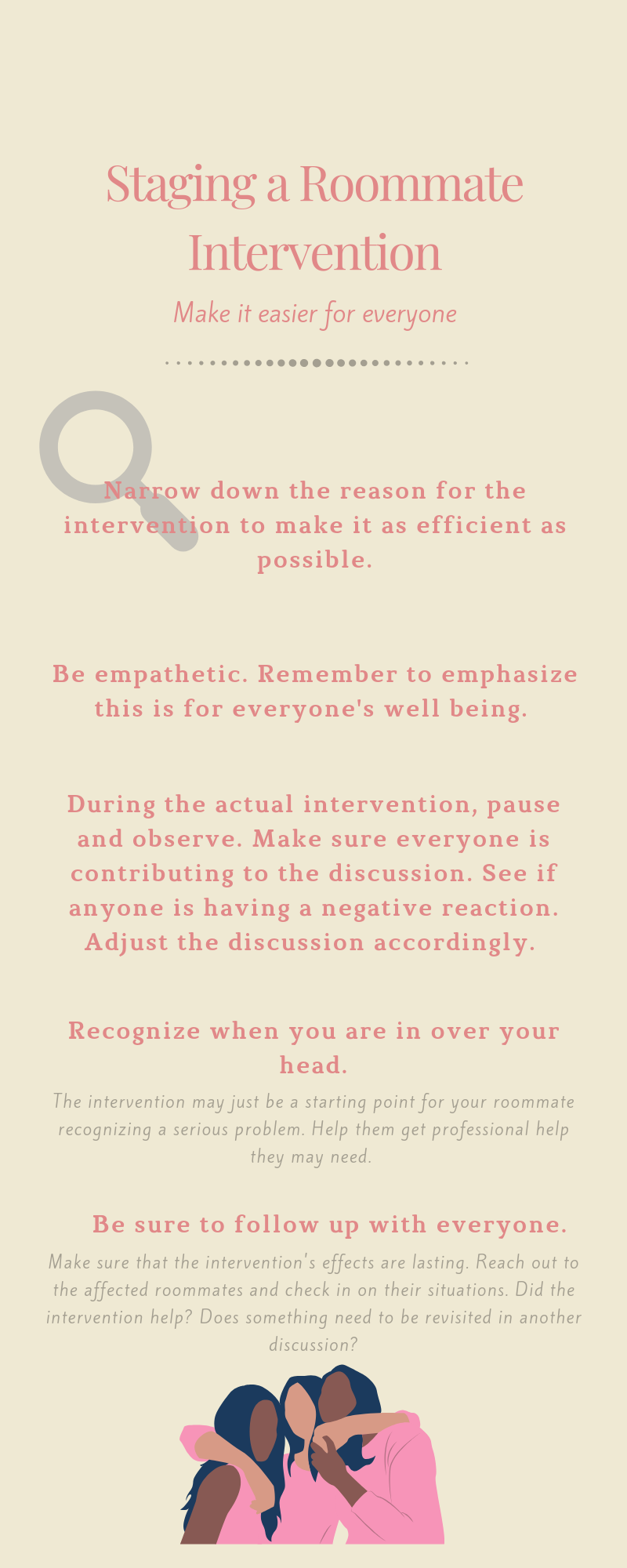Staging A Roommate Intervention

Unfortunately, roommate conflicts are all too familiar for college students. It’s nearly inevitable. With being in such close quarters all the time and in a mostly stressful time, one roommate is bound to rub off the wrong way or get into conflict. Or, one roommate’s behavior, either inside or outside of the home, can be enough to attract the concern of several housemates.
While it may seem hard to grasp, it may be up to the roommates to get to the root of the problem -- as touchy as the subject may be. In no way does this mean you, as roommates, are the only solution to the problem, but you may act as a vital step to getting the help your roommate needs or getting to the final solution of roommate conflict.
If you think a roommate intervention is in your near future, but have no idea how to approach the conversation, have no fear. Here are a few tips on how you can stage a roommate intervention successfully.

Narrow down the reason for an intervention
The reason that many roommate interventions may feel is that they are aimless -- those that stage it doesn’t have a direct intention and the intervention fails to be productive. Think about going to a big pitch meeting -- you are expected to go into the meeting fully prepared. You must prepare a pitch on your own beforehand and detail it out, you are expected to sell and push that pitch out to your audience. You would never go into that meeting with no pitch or argument to support it in mind, would you? Of course not. So why wouldn’t you think of a roommate intervention the same way?
Interventions are bound to be uncomfortable, so you don’t want to stretch out everyone’s discomfort by having an inefficient discussion full of silence and no direction. Instead, try to narrow down why you are staging a roommate intervention in the first time, and then the ideal solution you want to reach.
If you’re struggling to find a clear-cut reason, think about the issues you have been facing. For example, it may be your roommate’s erratic behavior - bringing people in and out of the apartment without anyone’s permission, things going missing, messy common areas. That’s enough to call for an intervention, but if you know there is a deeper reason behind the sudden change in behavior, like substance abuse or a traumatic event, you’ll want to keep that in mind as the thing you most want to focus on during the intervention. It is the root of the problem after all.
Or, if the issues your roommates have been facing are an issue between roommates, like not respecting each other’s belongings and space, or not following the rules of the living space, you may want to search for the root of the problem. This can be realizing that the roommate rules previously established aren’t working out after all and that you need to rework them, or that there is an underlying issue between a couple of roommates that needs to be addressed in order to make everyone’s relationships better in the household.
When you have successfully narrowed down a reason for the intervention, leading a discussion will be much easier to plan and work through when it comes to the actual intervention.
Remember: intervention does not equate confrontation
While you definitely do want to make the intervention worth it by reaching a “solution,” you don’t want to do it by forcing a solution. An intervention does not mean confrontation -- you cannot back the subject of the intervention into a corner and expect everything to go your way.
The intervention might seem like just a longwinded conversation, but the more you spend time thoughtfully talking through it, the less likely anyone involved in the intervention will feel cornered.
Do not rush a solution just because you want one, but remember that not all solutions may come straight away. Throughout the intervention, from planning to the conclusion, make sure that everyone is reminded that the intervention is to help everyone out, not to force someone else into a situation for a cause.
Put some serious time aside for the intervention
You may walk into an intervention expecting to face one problem, but may uncover an array of other problems that no one had expected. When staging an intervention, make sure you make room in everyone’s schedules. You don’t want to have an intervention and half-way through realize that you have to go to a shift at work, or that someone has class.
Interventions don’t take five minutes to happen and magically find a solution. Be ready to spend more time than you originally thought in discussion. Let everyone know involved that it may take a bit longer than expected so that someone can’t use time as an excuse to get out of the intervention.
You definitely do not want to put a definitive number on the intervention length. For example, if you say it’s only gonna take an hour. Someone may be keeping track of the hour, calling “Time’s up!” when a solution is nowhere close to being found, and the intervention will have been for nothing. An intervention is much more than a task and a chore, so make sure not to see or treat it like one.
Be empathetic
The ability to be empathetic may depend on the issue you are actually facing in an intervention. If it’s a conflict between roommates, it may be even harder to juggle issues between roommates and be empathetic. Especially if you are the one that feels wronged in the situation.
However, it is important to be empathetic during your roommate intervention. If one roommate is being standoffish, it may be because they feel backed into a corner with no way out. They could see the intervention as the first step to them getting kicked out of the apartment, or something of that level of severity. Or, the root of the problem you are approaching can be something entirely different than anyone could be thinking. Your roommate(s) may be working through something completely different than anyone could be thinking -- some family issues, hidden health concerns, and so on.
Remember that as much as you may feel wronged or see one way, make sure to stand in the other’s shoes to see where they are coming from. You may just find a solution that you would not have seen before.
Make sure to go into the intervention with an open mind, and be ready to possibly go outside of your comfort zones.

Emphasize the intervention as a good thing
The last thing you want to do when staging a roommate intervention is have someone feel attacked or like they are being cornered by all their roommates. When opening up the intervention, clearly state your intentions. If everyone is talking at someone versus talking with someone, the person will clearly feel targeted rather than being helped. The good intentions will lose out to their fear and anxiety.
Explaining your intentions can go differently depending on the personality of those you are approaching and what kind of topic you are bringing up.
If you have been noticing signs of substance abuse, for example, something like “You know we always have your best interest in mind, and as your friends, we’re worried for you. We want you to know that we are always here and that recent events have us concerned. We’re opening up a discussion to see if there’s any way that we can better help you.” Emphasizing that you have their best interest in mind, and your concern for their well being is very important.
Or, if you are staging a roommate intervention because you have been having a conflict with a specific roommate, emphasize that no one is taking sides. Say something like, “There is an obvious conflict happening in our apartment, and we really don’t want it to escalate further than it has. We’re sitting here today because we want to find a solution that works for everyone so that everyone can feel comfortable in our living space and so that this kind of situation doesn’t need to happen again.”
Make sure that no one is finger-pointing or playing the blame game, because that’s usually how interventions escalate into aggressive confrontations.
Sit back, take a breather, and observe
Depending on who is the one initiating the roommate intervention or leading the discussion, they may seem like the one in complete control, and the one on the offense. If it is you and you find yourself being the only one talking, don’t be afraid to stop and sit back. You don’t want to be the one dictating the intervention and silently saying “It’s my way or the highway,” so make sure that you are giving everyone involved the chance to offer their input.
When you take a second to pause from talking, you have the chance to calm yourself from whatever emotion you may be feeling - fear, anger, anxiety - and clear your mind for whatever you may need to say next.
Take the pause as a chance to observe how the intervention is going. You may notice that everyone is slowly going off-topic, and that the intervention is slowly becoming unproductive. Or, you may be able to read one’s body language and get a sense that things are going wrong. For example, you may notice that one roommate, in particular, is slowly shutting themselves off from the conversation and not taking anything in anymore, making the intervention unproductive.
Recognize when you are in over your head
As much as you and your roommates may want the best for each other, the solution will not always be yourselves. Even with the best intentions, you aren’t fully equipped to solve everyone’s problems and it’s important to remember that going into your roommate intervention.
If you are staging a roommate intervention because of a conflict between roommates, it will most likely be able to get fixed during the intervention. Yes, roommate conflicts can get pretty heated and serious, but solutions are much easier to come by. Changing up roommate agreements, switching rooms, finding a compromise will be much easier. However, if you are facing a much more serious subject like a roommate’s substance abuse or mental health, you are in for a bigger challenge during your roommate intervention.
You might not get the solution you want. If you and your roommates are not getting through to your roommate in need, you may need to end the intervention where it is and contact their family members to get them the help they desperately need -- the help that you can’t always give them.
Intervention may just be the first step for your roommate getting the help they need, so you don’t need to feel all of the weight on your shoulders. Know that the intervention is still successful if it’s helping them realize they have a problem. They can then get the help they need from a licensed professional, with the help of you and your roommates.
Make sure to follow-up, with everybody
Once the intervention is said and done, you’re thinking that you’re free to do whatever and pay no mind to the issue because it is in the past, right? Wrong. Interventions are not the end-all, but the step you take to pause current actions and divert one’s path from harmful actions. Wouldn’t you want to make sure that they stay on the right path after the fact? Of course.
An intervention is only good if it’s effective. You can’t just sit all your roommates, state your concerns, and hope for the best. Make sure that everyone stays on the same page in the future.
If the cause for the intervention is a roommate conflict, you might want to follow up with the affected roommates to make sure that the problematic behavior or issue has come to a complete stop or if something needs to be addressed. Likewise, if the cause was substance abuse or mental health concerns, you may want to consider checking in on your roommate to see how things are going.
Staging a roommate intervention is tough for everyone involved, but with these tips in mind, hopefully, it will go more smoothly than you think.
Interested in using our roommate matching formula to find the perfect college roommate for you? Create a profile & take the roommate quiz on Roomsurf! Get Started
